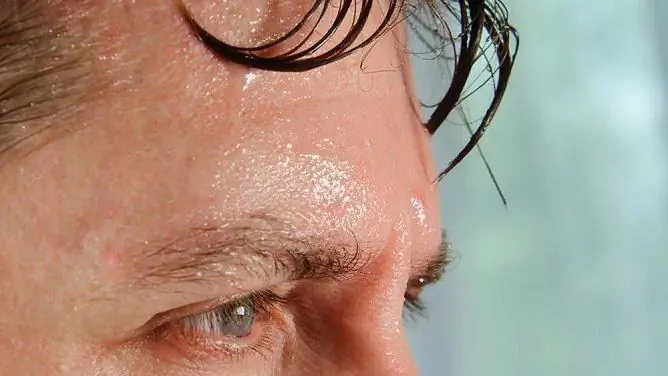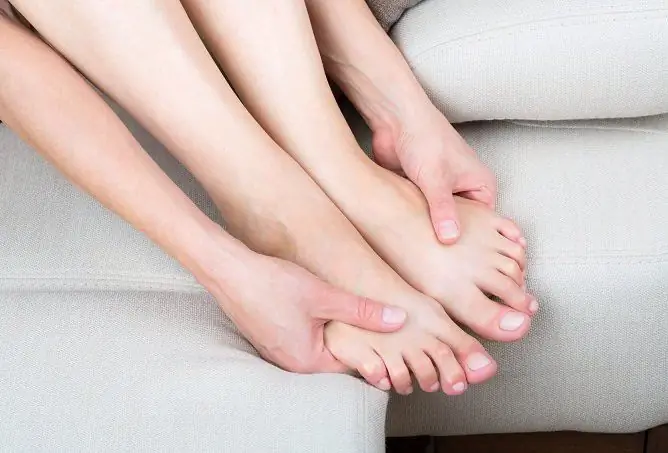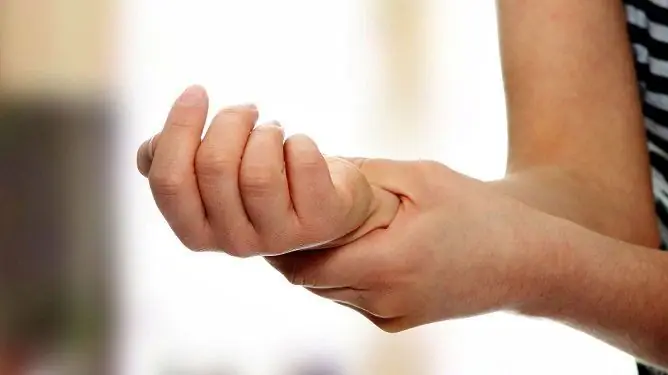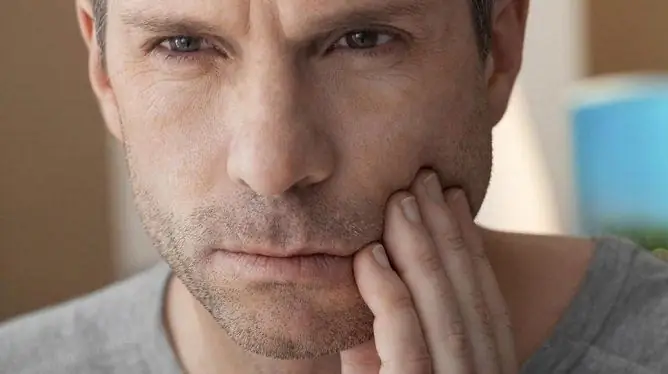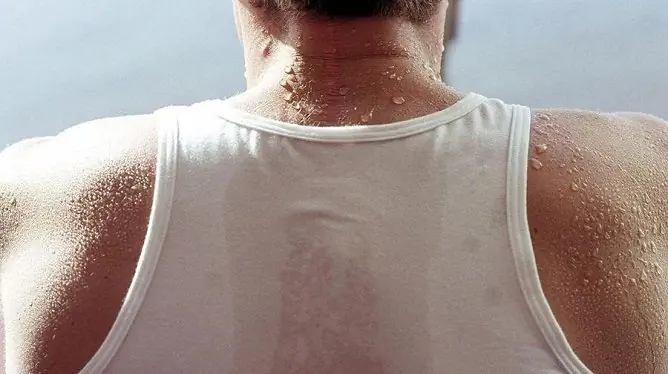- Author Rachel Wainwright [email protected].
- Public 2024-01-15 19:51.
- Last modified 2025-11-02 20:14.
Hyperhidrosis of the head and face: causes, treatment
The content of the article:
- The functions of the sweat glands and the mechanism of the development of pathology
- The reasons
-
Which doctor to contact
As evidenced by an unpleasant smell
-
Treatment of hyperhidrosis of the head and face
- Antiperspirants
- The use of psychotropic drugs
- Botulinum toxin injections
- Laser therapy
- Treatment with folk remedies
- Effects
- Video
Hyperhidrosis of the head and face (craniofacial hyperhidrosis) is excessive sweating that occurs for no apparent reason. Pathology can create serious problems and cause a patient's nervous disorders and difficulties in communication.

Increased sweating of the face and head can occur for various reasons.
Treatment of facial hyperhidrosis is difficult, since frequent washing increases sweating, and the use of antiperspirants on these parts of the body can cause an allergic reaction.
The functions of the sweat glands and the mechanism of the development of pathology
The craniofacial form of the disease is characterized by the release of a large amount of secretion from the sweat glands, which are located in the region of the temples, neck, forehead, nasolabial triangle, cheeks, scalp. This process can be accompanied by reddening of the skin and the appearance of perspiration.

Pathology develops due to increased secretion from the sweat glands
In the region of the head and face, many eccrine sweat glands are localized, which secrete transparent sweat, practically odorless. It contains a large amount of acids and salts that inhibit the growth of bacteria. But with a severe form of the disease, sweat begins to acquire a specific unpleasant odor.
Knowing about this feature, a person begins to get nervous before getting into a stressful situation, and his excitement leads to increased sweating. Therefore, for the successful treatment of the disease, the patient needs not only physiotherapy and medication methods of influence, but also the help of a psychotherapist or psychologist.
The reasons
The development of excessive sweating of the head and face is influenced by many factors:
- changes in hormonal levels. Disturbances in the work of the endocrine system can lead not only to the development of various diseases, but also to the appearance of excessive sweating. Most often, hyperhidrosis is a companion of diabetes mellitus or hyperthyroidism. Heavy sweating occurs in many women during menopause. Also, hyperhidrosis of the head and face can occur during pregnancy or lactation;
- overweight. Obesity can lead to a violation of the thermoregulatory mechanism. In obese people, metabolic disorders occur in the body, which leads to the fact that sweating occurs for no particular reason, even at night;
- diseases of the heart and blood vessels. Thermoregulation failure can occur in people with coronary heart disease, myocarditis, or hypertension;
- infectious diseases. Sweating of the head and face can occur in people with acute or chronic sore throat, flu, SARS. In some cases, hyperhidrosis indicates the development of a disease such as tuberculosis;
- disturbances in the work of the nervous system. Increased sweating occurs as a result of neurological disease, head or back injury, stroke, epilepsy, or Parkinson's disease;
- systemic diseases. Among the pathologies that increase the secretion of sweat include rheumatoid arthritis, Raynaud's disease;
- the use of certain medications. Violation of sweating is caused by drugs from the group of immunostimulants, antibiotics, corticosteroids, antiemetics, antidepressants;
- hereditary predisposition. Often, excessive sweating is passed from parent to child. The reasons why this happens have not been established. Often, symptoms of the disease occur even in childhood, sweating increases during puberty;
- tumor diseases. In rare cases, malignant neoplasms, in particular lymphomas, become the cause of excessive sweating of the head and face;
- acute and chronic psychological trauma. Sweating is caused by strong emotions, stressful situations, neuroses, asthenia, prolonged insomnia, severe pain when large doses of adrenaline are thrown into the blood. It activates the sympathetic part of the autonomic nervous system, which is responsible for the work of the sweat glands. In this case, psychogenic hyperhidrosis is diagnosed.
Sweating occurs in a hot room or during exercise. Eating hot or spicy foods can also lead to excessive sweating. The basis of this phenomenon is the reflex connections between the centers of sweating and salivation.

Sweating may be increased by the use of certain foods, in particular spices
The production of sweat in the head and face area is enhanced by the use of the following products:
- spice;
- salted fish or meat;
- sour fruits or vegetables;
- drinks containing caffeine;
- alcohol.
In young children, hyperhidrosis occurs due to the immaturity of the nervous system. During the daytime, the child is actively moving, and sweat evaporates from the surface of the skin. At night, the same amount of sweat is released, but it does not have time to disappear, so the baby's hair becomes wet.
Which doctor to contact
Since different pathologies can cause hyper-persistence, there is no specific treatment regimen for the disease. In order to diagnose the disease, you must consult a dermatologist. He, in turn, can send for examination to other specialists: endocrinologist, neurologist, cardiologist, pulmonologist or therapist.
Subject to the full course of treatment, the patient manages to get rid of the problem. The disadvantage of this method is that therapy lasts several months and requires strict adherence to all doctor's recommendations and self-discipline.
As evidenced by an unpleasant smell
If sweat has an unpleasant odor, this may indicate the development of certain diseases:
| Smell | Presumptive disease |
| Ammonia | Impaired renal function |
| Rotten fruit | Diabetes |
| Hydrogen sulfide | Chronic bowel disease or the presence of malignant tumors |
Treatment of hyperhidrosis of the head and face
Antiperspirants
There are universal remedies that do not affect the cause of the disease, but can reduce sweating for 3-5 days. Medicinal antiperspirants include zinc and aluminum salts, as well as formaldehyde and ethyl alcohol. These products can be used for facial sweating.

Facial antiperspirants can be used to relieve symptoms
Applying them to clean, dry skin allows you to narrow the ducts of the sweat glands, thereby reducing the production of sweat. Such drugs are active against bacteria, which prevents the appearance of a specific odor.
The disadvantage of this method is that the components of medical antiperspirants can block the excretory ducts of the sweat glands and lead to the development of an inflammatory process. These products cannot be used to eliminate scalp sweating.
The use of psychotropic drugs
To get rid of hyperhidrosis of the head and face caused by psychogenic factors, you can use psychotropic drugs. The correct selection of the drug and dose contributes to the rapid elimination of the problem. For the conservative treatment of pathology, the following drugs can be used:
- sedatives: Valerian extract, Sedavit, Trivalumen;
- tranquilizers: Gidazepam, Phenazepam;
- antipsychotics: Azapine, Azaleptin;
- tricyclic antidepressants: Fluoxetine, Prozac.
If infectious or endocrine diseases are the cause of the development of hyperactivity, the underlying disease must be treated.
Botulinum toxin injections
In order to get rid of sweating for 6-8 months, botulinum toxin injections are used. Preparations based on it innervate sweat glands and block nerve endings, after which sweat ceases to be released in a certain area.

One of the therapy methods used is botulinum toxin injections
The drugs are injected with a thin insulin needle, injecting the area of increased sweating. In some cases, temporary numbness may occur in this area, which disappears on its own within a few days.
Laser therapy
Some of the sweat glands can be destroyed with a laser. After local anesthesia has been carried out, an optical fiber is inserted through small punctures to the depth of the sweat glands and they are destroyed with the help of a laser. At the same time, a certain number of sweat glands remain intact, which ensures minimal perspiration.
Treatment with folk remedies
In order to get rid of hyperhidrosis of the head and face, you can use folk remedies:
- recipe number 1: 2 tablespoons of oak bark pour 1 liter of water and boil for three minutes. Then the product is infused under the lid for an hour and filtered. Use to rinse your hair after each wash. If you sweat your face with such a decoction, you need to wash your face once a day. A decoction of oak bark not only allows you to fight hyperhidrosis, but also strengthens the hair well;
- recipe number 2: 4 tablespoons of glycerin are mixed with two teaspoons of lemon juice. The product is applied to the hair area once a day, left for half an hour and washed off. In order to achieve the desired effect, it is used within a week;
- recipe number 3: one tablespoon of sage leaves is poured into 1 liter of boiling water and insisted for an hour. Then the infusion is filtered and used for washing and rinsing hair. It can also be taken orally half a glass three times a day.

Often, an infusion of oak bark is used to safely treat hyperhidrosis
Effects
Prolonged and severe hyperhidrosis of the head and face leads to the fact that a person's character changes, he becomes withdrawn, irritable, and does not make good contact with other people. If his professional activity is associated with close communication or public speaking, then he has problems at work. In such patients, the level of self-esteem becomes very low.
Hyperhidrosis of the head and face can become a serious problem that cannot be solved on its own. In most cases, special treatment is required. Therefore, if the fight against sweating at home does not work, you should consult a doctor.
Video
We offer for viewing a video on the topic of the article.

Anna Kozlova Medical journalist About the author
Education: Rostov State Medical University, specialty "General Medicine".
Found a mistake in the text? Select it and press Ctrl + Enter.

